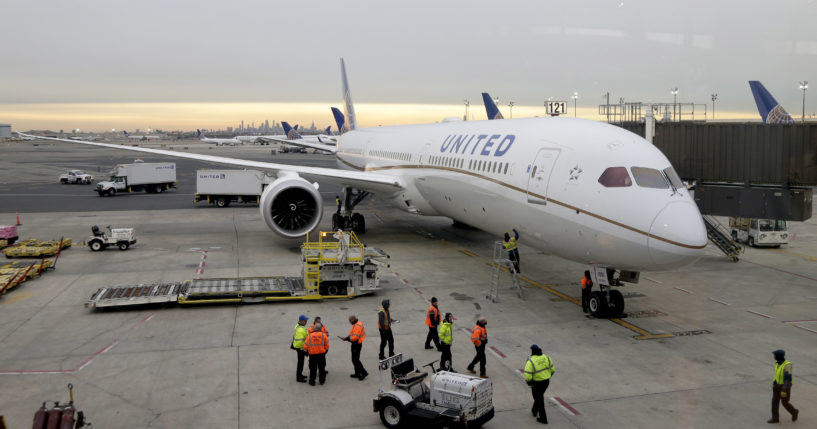
Airlines Warn This Week's 5G Launch Will Have Catastrophic Impact: 'The Nation's Commerce Will Grind to a Halt'
The airline industry is raising the stakes in a showdown with AT&T and Verizon over plans to launch new 5G wireless service this week, warning that thousands of flights could be grounded or delayed if the rollout takes place near major airports.
CEOs of the nation’s largest airlines say that interference from the wireless service on a key instrument on planes is worse than they originally thought.
“To be blunt, the nation’s commerce will grind to a halt” unless the service is blocked near major airports, the CEOs said in a letter Monday to federal officials including Transportation Secretary Pete Buttigieg, who has previously taken the airlines’ side in the matter.
AT&T and Verizon plan to activate their new 5G wireless service Wednesday after two previous delays from the original plan for an early December rollout.
The new high-speed 5G service uses a segment of the radio spectrum that is close to that used by altimeters, which are devices that measure the height of aircraft above the ground.
AT&T and Verizon say their equipment will not interfere with aircraft electronics, and that the technology is being safely used in many other countries.
However, the CEOs of 10 passenger and cargo airlines including American, Delta, United and Southwest say that 5G will be more disruptive than they originally thought because dozens of large airports that were to have buffer zones to prevent 5G interference with aircraft will still be subject to flight restrictions announced last week by the Federal Aviation Administration. They add that those restrictions won’t be limited to times when visibility is poor.
“Unless our major hubs are cleared to fly, the vast majority of the traveling and shipping public will essentially be grounded. This means that on a day like yesterday, more than 1,100 flights and 100,000 passengers would be subjected to cancellations, diversions or delays,” the CEOs said.
The airline CEOs asked that the new 5G be barred within two miles of airport runways.
AT&T and Verizon declined to comment. A trade group for the telecom industry, CTIA, did not immediately respond to a request for comment.
The showdown between two industries and their rival regulators — the FAA and the Federal Communications Commission, which oversees radio spectrum — now threatens to further disrupt the aviation industry, which has been hammered by the pandemic for nearly two years.
This was a crisis that was years in the making.
The airline industry and the FAA say that they have tried to raise alarms about potential interference from 5G C-Band but the FCC has ignored them.
The telecoms, the FCC and their supporters argue that C-Band and aircraft altimeters operate far enough apart on the radio spectrum to avoid interference. They also say that the aviation industry has known about C-Band technology for several years but did nothing to prepare — airlines chose not to upgrade altimeters that might be subject to interference, and the FAA failed to begin surveying equipment on planes until the last few weeks.
AT&T and Verizon spent billions of dollars for C-Band spectrum in a government auction run by the FCC, then spent billions more to build out new networks. In response to concern by the airlines, they agreed to delay launching the service from early December until early January.
Late on New Year’s Eve, Buttigieg and FAA Administrator Stephen Dickson asked the companies for another delay, warning of “unacceptable disruption” to air service.
AT&T CEO John Stankey and Verizon CEO Hans Vestberg rejected the request in a letter that had a scolding, even mocking tone. But they had second thoughts after intervention that reached the White House. They agreed to the second, shorter delay but implied that there would be no more compromises.
That was followed by a deal in which the telecoms agreed to reduce the power of their networks near 50 airports for six months. In exchange, the FAA and the Transportation Department promised not to further oppose the rollout of 5G C-Band.
President Joe Biden praised the deal, but the airlines weren’t satisfied with the agreement, regarding it as a victory for the telecoms that didn’t adequately address their concerns about trying to land planes at airports where the new service would be active.
The Western Journal has not reviewed this Associated Press story prior to publication. Therefore, it may contain editorial bias or may in some other way not meet our normal editorial standards. It is provided to our readers as a service from The Western Journal.
Truth and Accuracy
We are committed to truth and accuracy in all of our journalism. Read our editorial standards.
Advertise with The Western Journal and reach millions of highly engaged readers, while supporting our work. Advertise Today.












